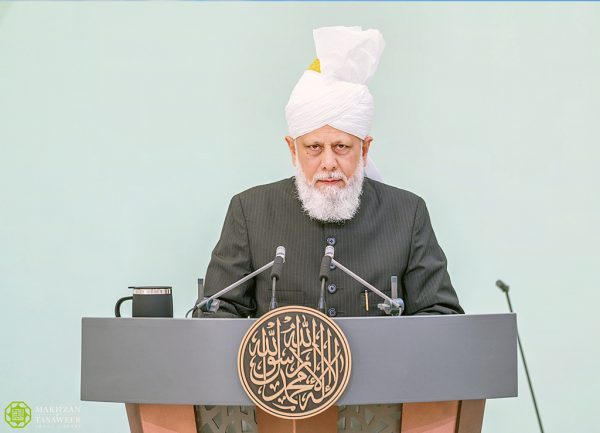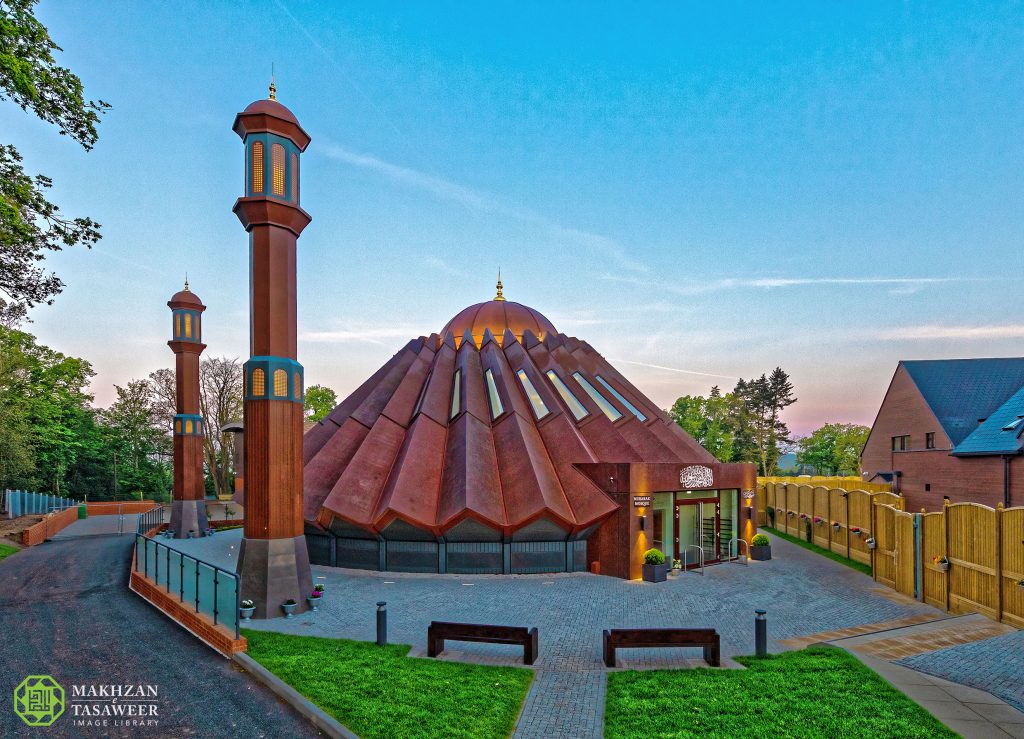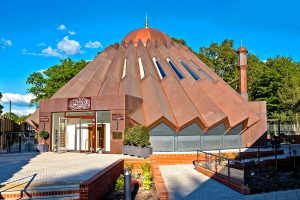After reciting Tashahhud, Ta‘awwuz and Surah al-Fatihah, His Holiness, Hazrat Mirza Masroor Ahmad (aba) said that he would continue mentioning details about the Battle of Mu’tah.

The Battle of Mu’tah
His Holiness (aba) said that during the battle, as the Muslims fought the Romans, a Roman soldier called out inciting the Muslims. A Yemeni Muslim ran out and hamstrung the Roman’s horse, took the Roman’s sword and killed him, after which he took his armour and weapons. Once the battle was won by the Muslims, Hazrat Khalid bin Walid (ra) sent word to that man and asked for that which he had taken to be gathered among the spoils. Hazrat Khalid (ra) was informed by Hazrat Auf (ra) that the instruction was for the spoils to go to the one who had overcome the enemy. Hazrat Khalid (ra) said he understood, but considered the spoils that the Yemeni man had taken to be in excess.
The matter was presented to the Holy Prophet (sa), who instructed Hazrat Khalid (ra) to return the spoils to the Yemeni Muslim. Upon this instruction, Hazrat Auf (ra) then expressed to Hazrat Khalid (ra) that he had already told him this and that he had been right. However, the Holy Prophet (sa) overheard this and asked about the matter. The case was presented before the Holy Prophet (sa) again, and this time, the Holy Prophet (sa) instructed Hazrat Khalid (ra) not to return the spoils to the Yemeni Muslim. He did this to teach a lesson that an appointed leader should be respected.
His Holiness (aba) said that during the Battle of Mu’tah, one of the items obtained as spoils was a ring, which was presented to the Holy Prophet (sa), which Hazrat Jabir (ra) said was then given to him.
His Holiness (aba) said that according to Hazrat Khalid bin Walid (ra), he broke nine swords during the Battle of Mu’tah. It is recorded that there were 3,000 Muslims while there were 200,000 Romans in this battle. The fact that the Muslims received spoils of war is a clear indication of the fact that they were indeed victorious in this battle.
His Holiness (aba) said that on the day Hazrat Ja’far (ra) was martyred, the Holy Prophet (sa) asked for Hazrat Ja’far’s (ra) sons to be brought to him. The Holy Prophet (sa) brought them close as he began crying. The Holy Prophet (sa) was asked whether he had received some news regarding Hazrat Ja’far (ra). The Holy Prophet (sa) replied, saying that Hazrat Ja’far (ra) had been bestowed the crown of martyrdom. The Holy Prophet (sa) then instructed others to send food to the home of Hazrat Ja’far (ra as his family mourned.
His Holiness (aba) said that the Holy Prophet (sa) went to his pulpit and informed the people about the martyrdoms of Hazrat Zaid (ra), Hazrat Ja’far (ra) and Hazrat Ibn Rawahah (ra). He conveyed this news on the same day that it happened, despite not apparently having yet received word from the battlefield; however, this matter had been revealed to him. The Holy Prophet (sa) then also informed the people that the Islamic flag had been taken up by a sword from among the swords of Allah. According to another narration, a messenger had come to convey the news, and the Holy Prophet (sa) said he also had some news, and the Holy Prophet (sa) delivered his news regarding the martyrdoms first, which he said was based on a dream which he had seen. Upon this, the person who had brought the news confirmed that the Holy Prophet (sa) was absolutely correct.
His Holiness (aba) quoted Hazrat Mirza Bashiruddin Mahmud Ahmad (ra) who explained that as word of the martyrs in this battle would be received in Madinah, the families would mourn according to the limits prescribed by Islamic teachings. Similarly, the Holy Prophet (sa) said, ‘There is no one to cry for Ja’far.’ This was not an instruction to cry over Ja’far; rather, this too was simply an expression of mourning, as if to recognise that Ja’far (ra) was also among the martyrs, yet when the Holy Prophet (sa) did not cry, neither should the others. This is what the Holy Prophet (sa) sought to convey. When the Muslims heard this, they went to their homes and told their wives that rather than crying at home, they should go to the home of Ja’far (ra) and cry there. When the Holy Prophet (sa) heard this, he asked what had happened, upon which the Muslims replied that they had sent their women to the home of Ja’far (ra) to cry in order to fulfil what he said. The Holy Prophet (sa) said that this was not at all what he had meant, and instructed that the women should be told to stop crying. The Holy Prophet (sa) had made his statement to express that just as he had, everyone else should exhibit patience as well. When the Muslim man went to tell the women to stop crying, they said they would not stop as they had heard what the Holy Prophet (sa) had expressed. When the Muslims informed the Holy Prophet (sa), he replied, saying, ‘Pour dust over their heads.’ This is the literal translation of an Arabic idiom, which in reality means to ‘leave them be.’ However, that Muslim man did not understand the idiom and literally began pouring dust over the women’s heads. Hazrat A’ishah (ra) then had to explain to him that the Holy Prophet’s (sa) statement was in fact an idiom, not something that was to be taken literally. This shows that sometimes people do not understand metaphorical sayings and take them literally. In this case, a man did not understand, and it was Hazrat A’ishah (ra) who, in her wisdom, understood and had to explain the matter to him. At the same time, this incident shows the immense love and obedience that the companions had in their hearts for the Holy Prophet (sa).
His Holiness (aba) said that according to narrations, 12 Muslims were martyred during this battle. This in itself is a miracle, that despite the disparity in numbers between the two armies, there were so few martyrs on the Muslim side, while so many of the enemy army were killed and their army was ultimately defeated.
His Holiness (aba) said that when the Muslim army returned to Madinah, they were greeted by the Holy Prophet (sa) and his companions. Some Muslims in Madinah thought that this army should not have returned but should have all been martyred in the battle. Some taunted them, calling them those who fled. The Holy Prophet (sa) said to them that these Muslims were not those who fled, but rather they were those who turned around and launched an attack.
The Expedition of Hazrat ‘Amr bin al-’Aas (ra)
His Holiness (aba) said that then there was an expedition known as the Expedition of ‘Amr bin al-‘Aas, which took place in Jamadi al-Thani 8 AH. The Holy Prophet (sa) received word that a tribe from the Banu Khuza’ah was on the outskirts of Madinah, preparing for an attack. In order to intercept them, the Holy Prophet (sa) appointed Hazrat ‘Amr bin al-‘Aas (ra) as leader over a contingent of 300 Muslims. The Holy Prophet (sa) granted Hazrat ‘Amr (ra) a white flag as well as a black flag. The army travelled by night and hid by day, until reaching a well-known place called Salasil. Upon arriving, the Muslims realised that the enemy army was quite large. As such, Hazrat ‘Amr (ra) sent a request for reinforcements, which the Holy Prophet (sa) granted. Hazrat Abu Bakr (ra) and Hazrat ‘Umar (ra) were also part of this army. At night, the Muslims sought to light fires to keep warm. However, Hazrat ‘Amr (ra) instructed them not to. Later, he explained to the Holy Prophet (sa) that he had given this instruction because he did not wish for the enemy to realise their actual number, and thereby call for reinforcements and attack the Muslims. The Holy Prophet (sa) appreciated this strategy employed by ‘Amr (ra).
His Holiness (aba) said that when the Muslim army arrived where the enemy army had gathered, the enemy army fled, and there was only a small battle with a small contingent. The Muslims gathered spoils and returned to Madinah.
The Expedition of Hazrat Abu Ubaidah bin al-Jarrah (ra)
His Holiness (aba) said that then there was the Expedition of Hazrat Abu Ubaidah bin al-Jarrah, which took place in Rajab 8 AH. This is also known as the Expedition of Sif al-Bahr (Sea Shore), as the companions had encamped on the shore of the Red Sea. Hazrat Abu Ubaidah bin al-Jarrah (ra) was appointed as the leader of this expedition, which comprised 300 Muslims, including Hazrat Umar (ra). This expedition was to protect a trade caravan of the Quraish, which was under threat from the Juhainah tribe. This was in accordance with the Treaty of Hudaibiyah. This shows that the Muslims did not set out for battle, nor is any battle mentioned in the details of this expedition.
His Holiness (aba) said that he would continue mentioning these details in the future, including incidents like the Conquest of Makkah. His Holiness (aba) said that this series has become extended, as he has also taken time to make mention of the deceased and some martyrs in his sermons.

Appeal for Prayers in Light of Increased Tensions in the Subcontinent & Guidance for Use of Social Media
His Holiness (aba) said that he once again wished to draw attention towards prayers regarding the war brewing between Pakistan and India. May peace and harmony prevail, because the weapons used in warfare these days result in the killing of civilians, as is the case in these current circumstances as well. His Holiness (aba) said that we should pray that both sides agree to peace and avoid great loss.
His Holiness (aba) said that it must also be borne in mind that through social media or the internet in general, electronic media and messages, people freely express their opinions and say whatever they please, which results in greater harm than benefit. They express that which they themselves desire. Ahmadis should abstain from doing so, because these expressions give greater harm than benefit. If they wish to express anything, then it should be a message of peace and harmony. Towards the end of his life, the Promised Messiah (as) wrote A Message of Peace in which he expressed that there should be peace and harmony. This is what every Ahmadi should strive for. May Allah protect all the innocent.
His Holiness (aba) said that it seems certain major powers are seeking to fan these flames, desiring for the two sides to fight and become weakened. May Allah protect against their evil.
His Holiness (aba) also urged prayers for the people of Palestine, that may Allah create ease for them and enable them to live peacefully in their land, though there does not seem to be any possibility of peace. There seems instead to be a push to expel them from their land. His Holiness (aba) prayed that may Allah grant sense to the Muslim countries, enabling them to unite. If they unite, then many problems can be solved. If a world war does break out, then those who think they will be safe are wrong, for it will encompass everyone. May Allah protect everyone.
His Holiness (aba) said that the only solution is to turn towards God. There is no path besides this to be saved. May Allah enable everyone to do so.
Summary prepared by The Review of Religions




Add Comment